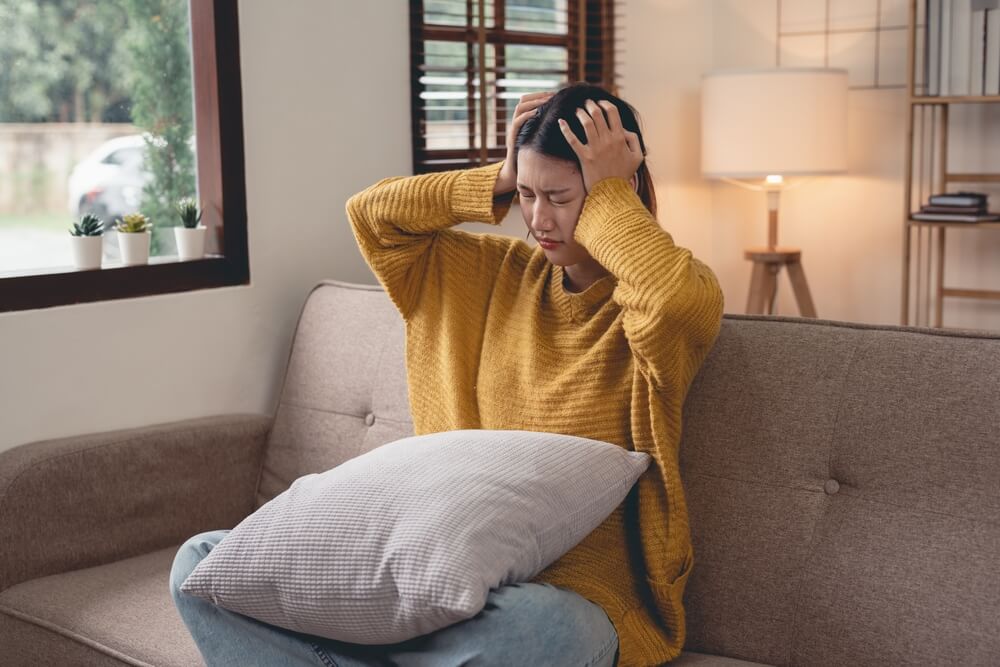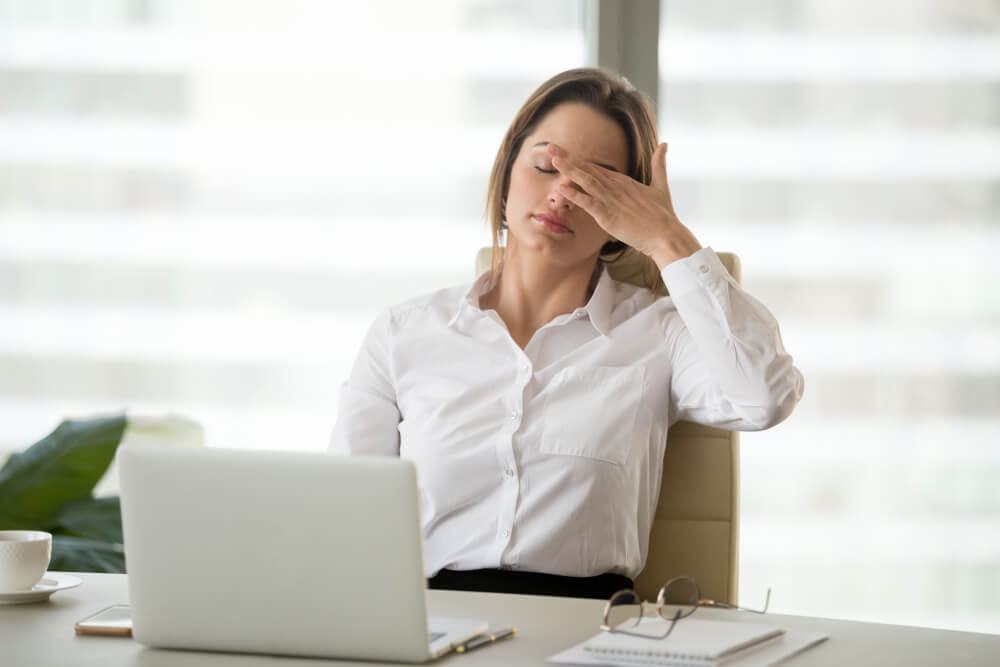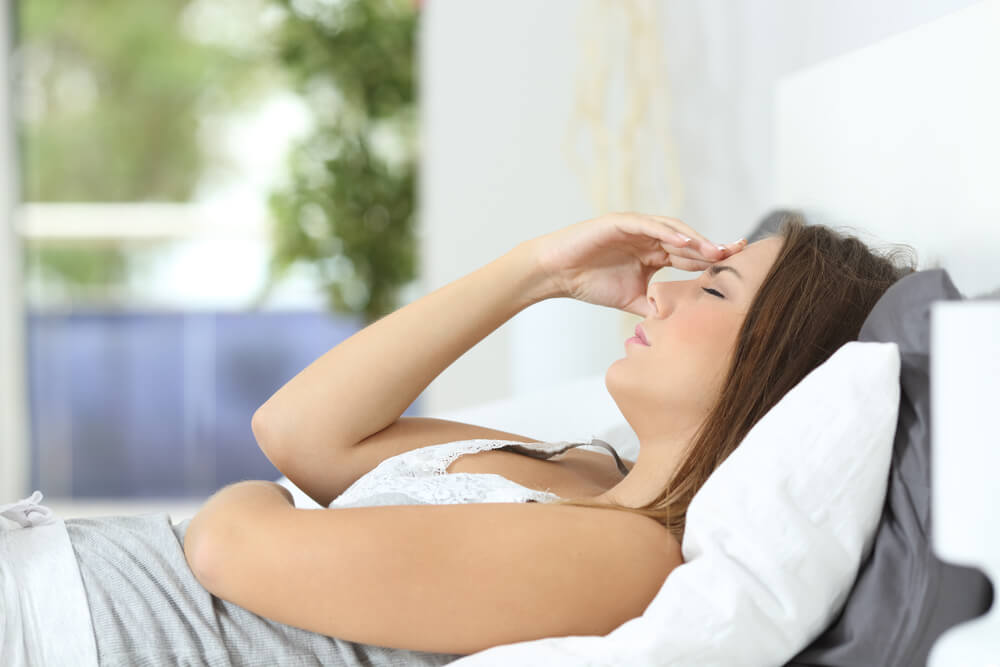Period headache, hormonal headache, or menstrual migraine are all names for a headache connected to a woman’s menstrual cycle and the misbalance in hormones that occurs during the period. The levels of estrogen and progesterone in the body change during your period, and for some women, this causes severe period migraines.
Migraines, in general, are a neurologic condition, and they are characterized by immense, pulsating pain, usually on one side of the head.
Period headaches can occur before the period starts as well as during “that time of the month.” This can continuously happen every month, and the most common symptoms of headaches during period are fatigue, nausea, pulsating sensation in your head, lightheadedness, and reactivity to light. Movement, sounds, and smells can also negatively impact the condition.
As this type of headache is closely connected to your menstrual cycle, it is vital to find an expert gynecologist to help you manage this condition. A wide variety of services related to gynecological care in Boca Raton & Boynton, FL, are offered, but make sure you thoroughly research your options to select the best doctor. There are different OBGYN specialists in Boca Raton and Boynton Beach, so you have plenty to choose from.
Hormones and Headaches
What is the exact connection between hormones and headaches? It does not make much sense that hormones can cause headaches, right? Surprisingly, when headaches occur in women, they are mostly connected to changes in estrogen hormone levels. Estrogen has a very significant role in a woman’s body because it controls cholesterol, your menstrual cycle, protects bones, affects your skin, the health of your heart and brain, etc.
The highest amount of estrogen in the body occurs mid-cycle, while the lowest amount is when women are on their periods. The level of this hormone drops right before the period flow starts. PMS headaches occur when the levels of estrogen and progesterone reach the lowest level.
It is important also to mention that the menstrual cycle is not the only cause of headaches because any drop in hormones, for any reason, can cause pain since these hormones affect chemicals that trigger pain sensations. Migraines can additionally be caused by stress, caffeine, poor diet, sleep loss, and the like.

ABCs of Period Migraines
We researched this topic in-depth, and below, you can find some of the essential information about headaches during period, so you know what to do if you are dealing with this condition.
- Around 60% of people suffering from migraines are women due to the presence of specific hormones in their bodies.
- Before puberty, boys get more migraines, but after puberty, this changes and continues occurring until the post-menopause period in women.
- Menstrual migraines occur up to three days before starting your period.
- The main cause of headaches during period involves changes in estrogen levels. Still, period migraines can be caused by birth control pills, perimenopause, hormone replacement therapy, pregnancy, oophorectomy, post-labor conditions, etc.
- The main symptoms of menstrual migraines are headaches, which can range from light to severe, on one or both sides of the head. Other symptoms include sweating, chills, high reactivity to loud noises, light, and smells, appetite loss, blurry vision, sensitive scalp, dizziness, nausea, vomiting, pale skin, tiredness, diarrhea, fever, etc.
- Aura before the start of the migraine does not occur in everyone, but some women experience it as a “sign” that the migraine is about to occur. This is characterized by visual or other disturbances, which occur an hour before the migraine begins.
- When it comes to PMS headaches, they might cause additional symptoms which slightly differ from the menstrual migraine ones, such as fatigue, acne, pain in the joints, constipation, rare urination, loss of coordination, increase in appetite, different cravings for sweets, salt and alcoholic beverages, etc.
- Diagnosis of menstrual headaches can be made by your chosen medical provider when they confirm the history of your symptoms.
To confirm this, they might ask questions concerning:
- The location and severity of the pain
- The type of pain (pounding, pulsating, or throbbing)
- The frequency of the headaches
- Any tactics you use to help with the migraines
- Anything that worsens the condition
- The medication you take and how often you take it
- How you feel before, during, and after the pain occurs
- Your diet
- Common stressors
- Everyday activities
- Family anamnesis

Additionally, your chosen doctor might perform blood tests and CT or MRI scans to exclude any other potential issues that might be causing the migraines.
- It is often recommended to keep a migraine journal or the so-called headache diary. It might sound odd, but noting your symptoms, occurrences that worsen or better the migraine, how long the migraines last, when they appear, and alike might help your doctor with creating solutions to your problem.
- Headaches during the period are most commonly treated with anti-inflammatory medication, which is nonsteroidal, such as Ibuprofen, Ketoprofen, and the like. These meds are best taken a few days before the start of the period and continued until the end of it. This limits the negative effect the medication can have on other systems in the body as it is taken for a short period of time only.
For acute migraines, specialists usually recommend serotonin receptor agonists, which can stop the menstrual migraines before they begin. Additionally, doctors may recommend small dosages of ergotamine, estradiol patches, vaginal rings, beta-blocker drugs, anticonvulsants, calcium channel blockers, estrogen patches and pills, contraception, caffeine, corticosteroids, certain antidepressants, and the like.
There are also some alternative methods and remedies, sometimes advised to women suffering from menstrual migraines, such as headbands with electrical pulses, magnets with second pulses, devices that send mild electrical pulses, acupuncture, biofeedback, ice patches, avoiding salty food, massages, relaxation techniques, breathing exercises, yoga, vitamin B2, etc.
- Certain tactics can help in the prevention of period headaches, such as a healthy lifestyle, a consistent schedule of sleeping, everyday physical activity, drinking around eight glasses of water a day, regularly eating without skipping meals, using relaxation techniques frequently, avoiding surplus amounts of sugar and salt, and similar.
It is important to note that not all of these work for everyone, and discussing this topic with your chosen medical professional is crucial.
- When it comes to potential side effects of the medication women take to control menstrual migraines, here are some of the most common ones: pressure in the chest, dryness of the mouth, burning feeling, tingling, nausea, sleepiness, warm or cold sensations, and similar.
We Are Here For You!
Our expert team is here to provide guidance and advice on mitigating symptoms and aches caused by period migraines. Contact us and schedule an appointment, so you can start living pain-free!


